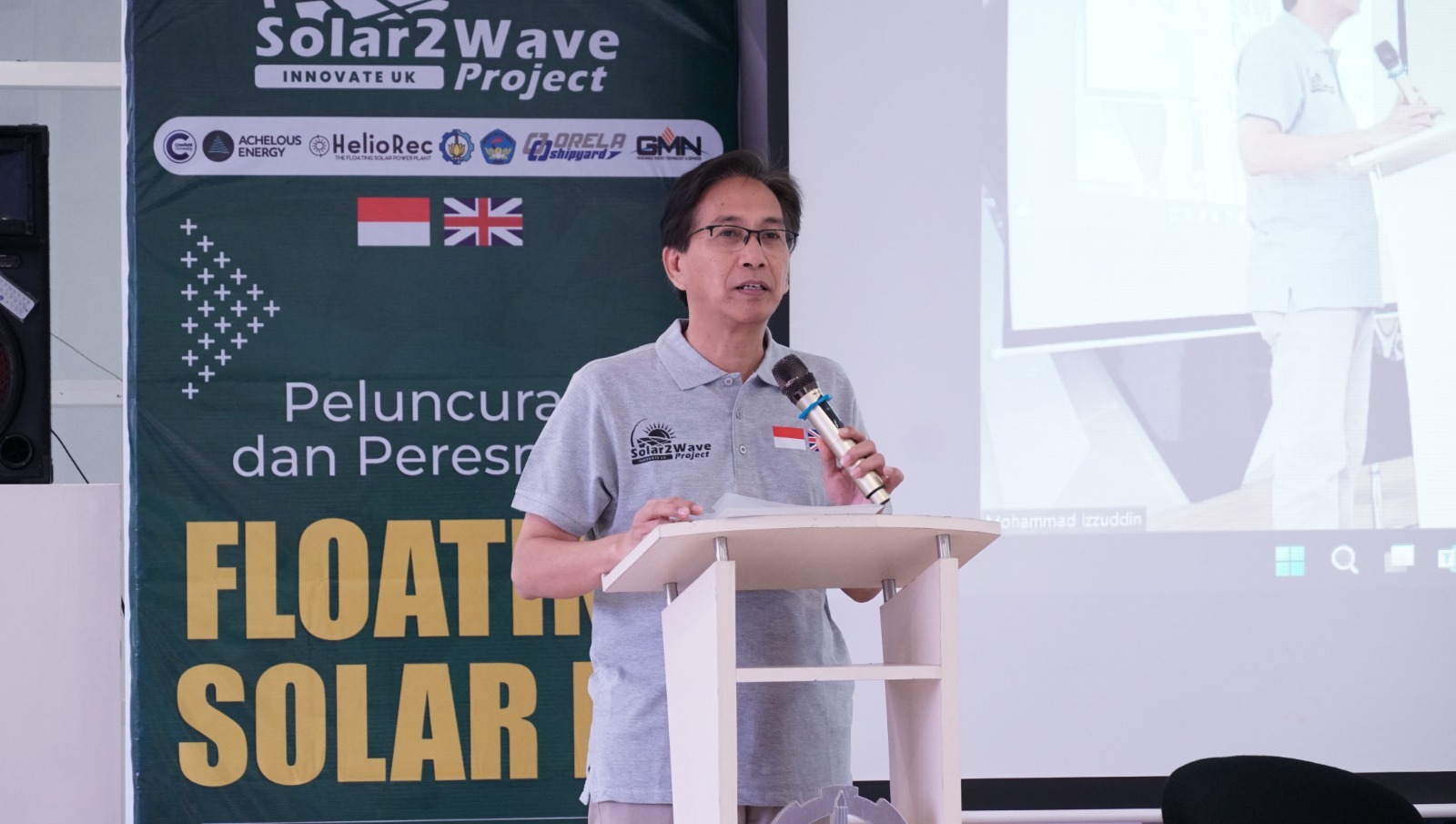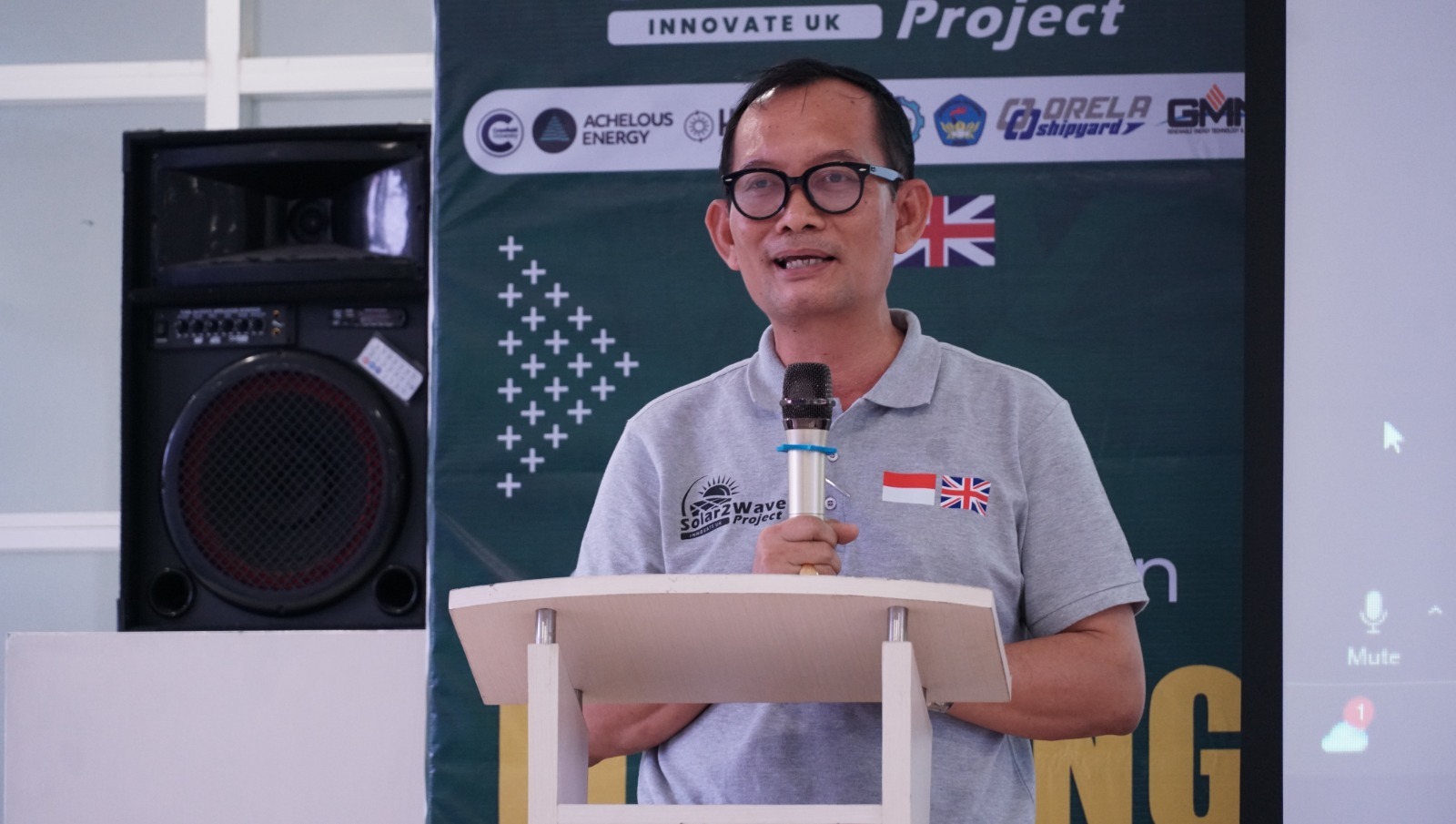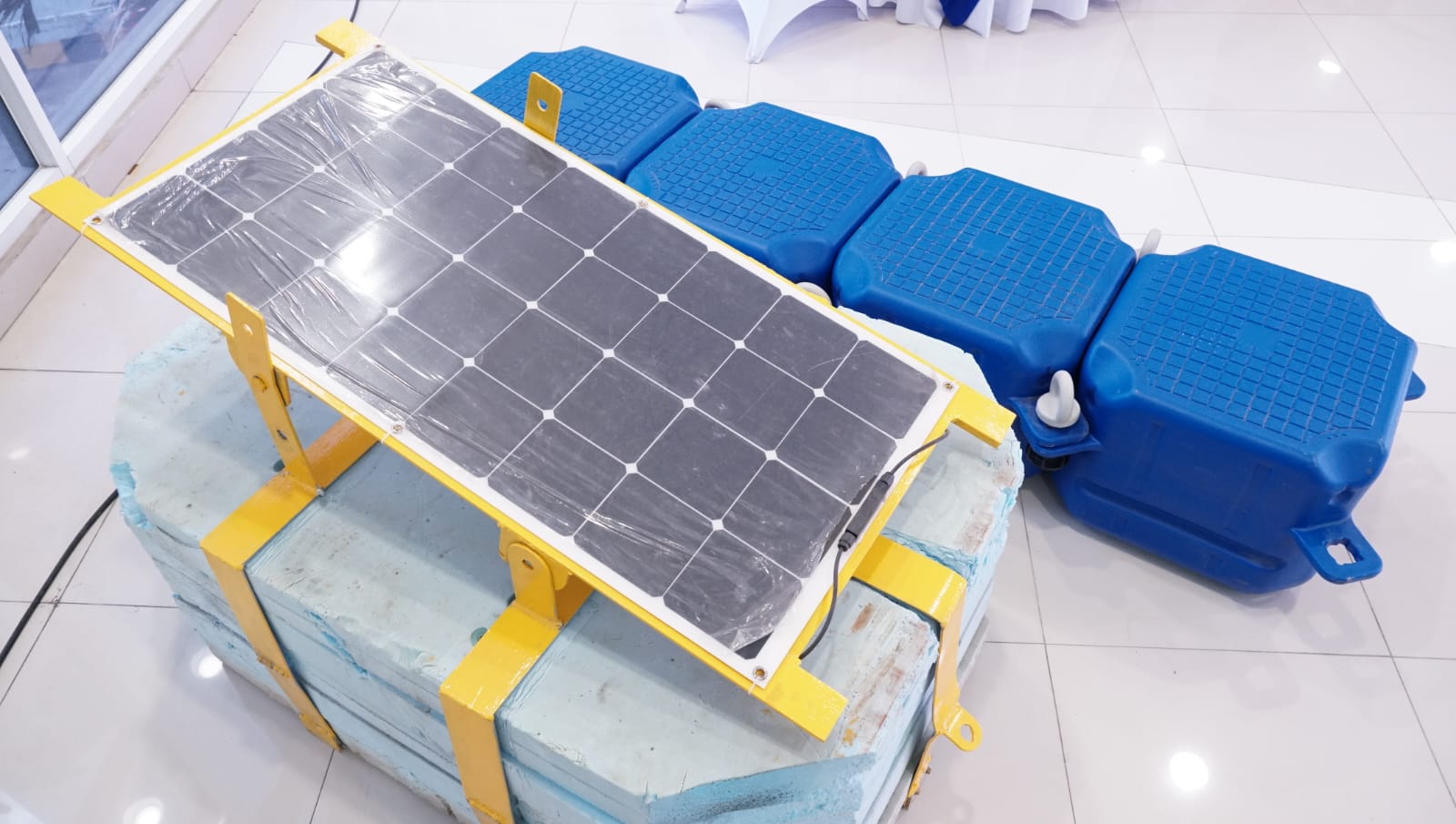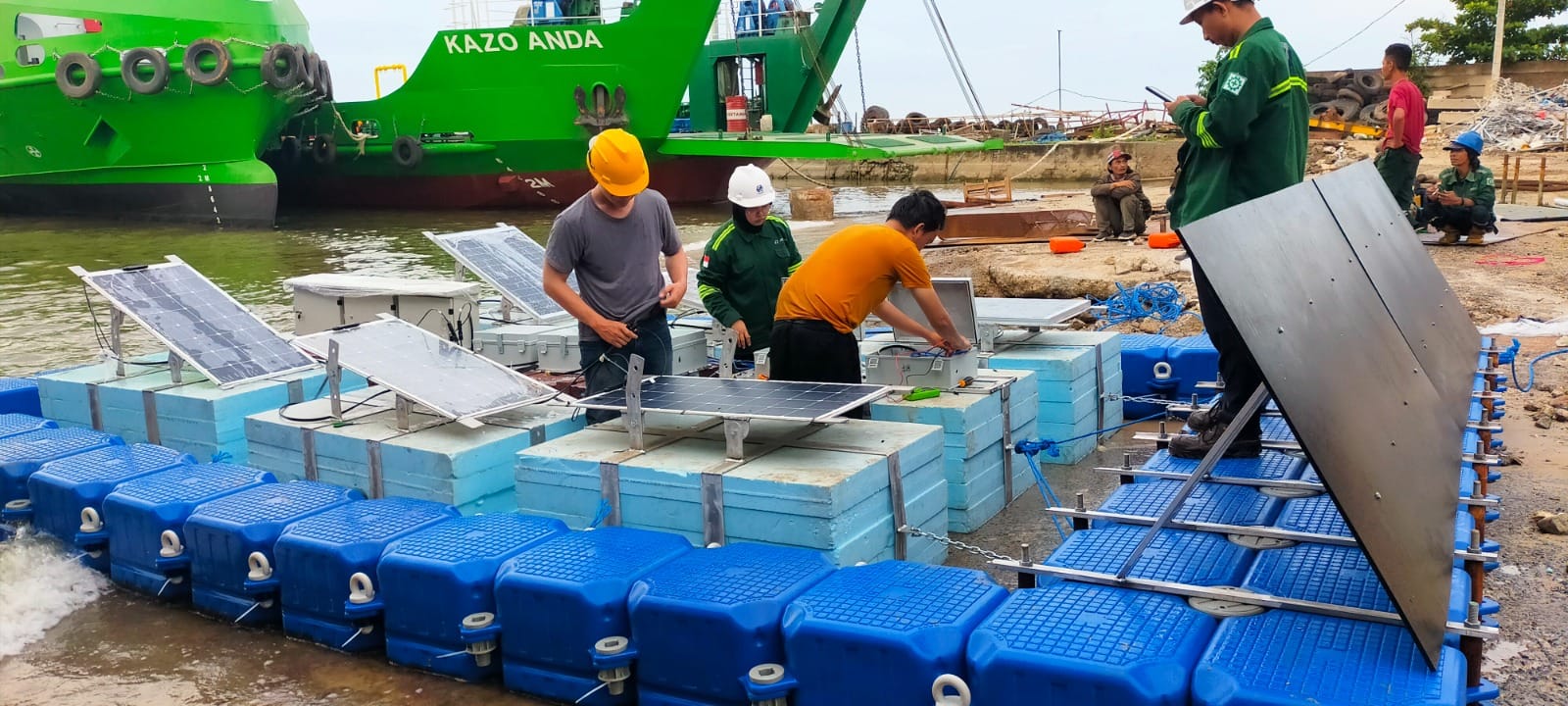ITS Launches the First Marine Floating Solar Power Plant Prototype in Indonesia

ITS Chancellor Prof Dr Ir Mochamad Ashari MEng IPU AEng giving a speech at the Launch and Inauguration of Solar2Wave, result of ITS international collaboration with Innovate UK, Cranfield University, Universitas Pattimura, and industrial partners
ITS Campus, ITS News — Institut Teknologi Sepuluh Nopember (ITS)‘s commitment in realizing the energy transition is getting serious. This time, through a research funded by Innovate UK, ITS together with Cranfield University, Universitas Pattimura (Unpatti), Orela Shipyard, PT Gerbang Multindo Nusantara, Achelous Energy Ltd, and HelioRec launched a prototype of the first marine solar power plant floating structure in Indonesia entitled Solar2Wave at the ITS Research and Technology Innovation Gallery (GRIT), Monday (18/3).
ITS Chancellor, Prof Dr Ir Mochamad Ashari MEng IPU AEng, said that the current development of floating solar power plants in Indonesia is still limited to the lake or reservoir scale. This limited area makes the utilization area for solar power plants less than optimal. “Therefore, to maximize the potential and impact of this floating solar power plant, we are expanding its application area to the sea,” said the chancellor, or often called Ashari.
Even though the impact can be expanded, the development of floating marine solar power plants faces severe obstacles in its realization, according to Ashari. One of the main problems disrupting this effort is large sea waves, which can damage solar panels. For this reason, according to this Electrical Engineering Department professor, Solar2Wave is the answer to this problem.

Head of the Indonesian Research Team, Prof Dr I Ketut Aria Pria Utama MSc, presenting the results of the first marine floating solar panel prototype project in Indonesia entitled Solar2Wave
The head of the Solar2Wave Indonesia research team, Prof. Dr. I Ketut Aria Pria Utama MSc, explained that Solar2Wave is a project to develop a floating solar panel area equipped with an integrated system to overcome wave problems. The solar panel area at Solar2Wave is equipped with floaters and is surrounded by a breakwater, which minimizes the impact of strong waves on the floating solar panels.
Furthermore, the prototype being developed consists of six monocrystalline and polycrystalline solar panels with a total capacity of 600 watts, explained the professor, who is familiarly called Ikap. Solar2Wave is also equipped with an energy storage system, such as a 12-volt battery with a voltage of 65 AH. “The floating cubes used have also been certified and are resistant to ultraviolet light, anti-corrosion from seawater, chemicals, and oil,” he explained.

Solar panel prototype on display at the Launch and Inauguration of Solar2Wave in the ITS Research and Innovation Gallery
After successfully developing the prototype in the Orela shipyard area in Gresik, the Solar2Wave research pilot project will be developed in the Gili Ketapang area, Probolinggo, East Java. According to Ikap, this regional selection was based on various factors, including the number of residents who need electricity assistance, the social conditions of the population, and accessibility to the Solar2Wave installation area itself.
Furthermore, Ikap said that the construction of this pilot project will have a capacity of 25 kilowatts. This high electrical power will reduce people’s dependence on diesel-fueled power plants. “Solar2Wave is projected to be able to support the daily electricity needs of the people as well as an ice cube factory, which is one of the important needs of fishermen in the Gili Ketapang area,” explained this man from Bali.

The process of installing electrical and construction components
On the other hand, regarding challenges, Ikap revealed that the initial stage of research, which started from March 2023 to February 2024, encountered several obstacles in its development. These include out-of-control ocean wave conditions, weather conditions, complex maintenance, and unpredictable operational costs. However, Ikap admitted that his team strives to perfect this research for optimal energy output.
In addition, Ikap said that at this initial stage, Solar2Wave research received funding of three hundred thousand pounds (£300,000) from Innovate UK. For further research, which will begin in April 2024, this project will receive funding of five hundred thousand pounds (£500,000) in the future. “Moving ahead, the number of research partners will also increase, especially from the government,” said the ITS Professor of Naval Architecture Department.

Chancellor of Universitas Pattimura Prof Dr Fredy Leiwakabessy MPd, when giving a speech at the Launch and Inauguration of the Solar2Wave Floating Solar Panel at the ITS Research and Technology Innovation Gallery (GRIT)
Meanwhile, Unpatti Chancellor Prof Dr Fredy Leiwakabessy MPd said that realizing this project was a form of utilizing Indonesia’s unlimited marine potential to equalize community welfare. Freddy hopes that this project will accelerate community welfare in the future, especially in Maluku.
Finally, Fredy is optimistic that through the broader realization of Solar2Wave, he will be able to increase community accessibility in various sectors to ensure optimal fulfillment of needs. “Starting from transportation, logistics, to education to create the next generation of Golden Indonesia,” he concluded hopefully. (ITS Public Relations)
Reporter: Shafa Annisa Ramadhani
Translator: Lael Alphenos Soebakir
Related News
-
ITS Sends Off 12 Free Mudik Vehicles Ahead of Eid Al-Fitr
The dispatch of 11 bus fleets carrying ITS students for the Free Mudik ITS 2024 ITS Campus, ITS News
April 05, 2024 06:04 -
ITS Lecturer Wins 2024 Female Science Talents Intensive Tracks from Germany
Sri Fatmawati SSi MSc PhD, a lecturer at the Department of Chemistry, ITS, has emerged as the winner of
April 05, 2024 06:04 -
ITS Shares Tips & Tricks on SNBT 2024 Socialization
(from left) Executive Secretary of SNPMB 2024, Bekti Cahyo Hidayanto SSi MKom, Head of the Admissions Subdirectorate at ITS,
April 05, 2024 06:04 -
Supporting Defense in Indonesia, ITS Professor Creates Anti-Radar Material
Professor Dr. Mashuri SSi MSi, while delivering his academic oration on anti-radar materials during the ITS Professorial Inauguration. ITS
April 05, 2024 06:04
